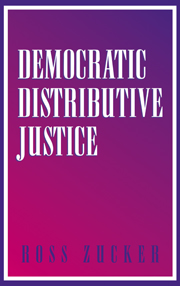Book contents
- Frontmatter
- Contents
- Acknowledgments
- 1 Democracy and Economic Justice
- Part I Unequal Property and Individualism in Liberal Theory
- Part II Egalitarian Property and Justice as Dueness
- Part III Egalitarian Property and the Ethics of Economic Community
- Part IV Democracy and Economic Justice
- 13 Democratic Distributive Justice
- 14 Democracy and Economic Rights
- Conclusions
- References
- Index
14 - Democracy and Economic Rights
Published online by Cambridge University Press: 02 December 2009
- Frontmatter
- Contents
- Acknowledgments
- 1 Democracy and Economic Justice
- Part I Unequal Property and Individualism in Liberal Theory
- Part II Egalitarian Property and Justice as Dueness
- Part III Egalitarian Property and the Ethics of Economic Community
- Part IV Democracy and Economic Justice
- 13 Democratic Distributive Justice
- 14 Democracy and Economic Rights
- Conclusions
- References
- Index
Summary
INCLUDING CONTROVERSIAL ECONOMIC RIGHTS
Dahl's revised theory of polyarchy (Dahl 1980) includes primary political rights in the definition of democracy but excludes economic rights as too controversial: “claims to primary social rights tend to be more debatable and uncertain in democratic theory and practice than claims to primary political rights.” Rawls's liberal conception of political justice uses much the same reasoning to exclude distributive justice from the constitutional essentials of democracy (Rawls 1993). Although agreement between Rawls and Dahl on this point lends great weight to their argument, I believe that the controversiality of economic rights does not disqualify them from being among the defining characteristics of democracy.
The worldwide increase in the number of polyarchal democracies in recent years, from twenty-nine in 1969 to ninety in 1990, seemingly confirms that there is an emerging consensus on primary political rights. However, when polyarchies were in the minority and their rights were more debatable globally, American political scientists nevertheless included these rights in the definition of democracy. Now that economic rights are relatively more controversial than political rights, these scholars exclude economic rights as more debatable. There is an apparent inconsistency in their treatment of the implications of the controversiality of different categories of rights. If political rights could be included in 1969, when they were more controversial than at present, then economic rights should be includable despite their being more controversial than political rights. Although primary political rights may now be relatively less controversial than economic rights, they are still highly controversial.
- Type
- Chapter
- Information
- Democratic Distributive Justice , pp. 287 - 300Publisher: Cambridge University PressPrint publication year: 2000



